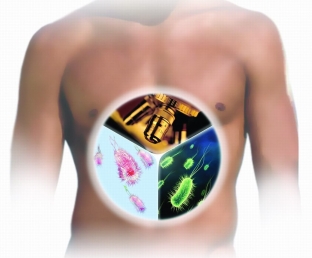The problem of excess weight and whether to follow a diet is of interest to most of the beautiful half of humanity. There comes a time when women who follow a certain type of diet react differently to it. What are the true causes of obesity and why one food brings a different effect on different organisms. The same questions are of interest to scientists and nutritionists, who have recently stepped up their efforts and began to study the relationship between food and the process of its processing in the intestine. This issue was taken up by scientists at the Weizmann Institute in Israel, who decided to move from research within the framework of medical assumptions to human observation in order to study the intestinal microflora, identify beneficial and harmful bacteria in the intestine to determine the cause of obesity.
What is the research of scientists in Israel
A team of scientists and physicians led by Eran Segal and Eran Iliney studied one thousand people and observed the body's reaction to eating food. To do this, each meal was strictly controlled, weighed, the experimental subjects handed over a myriad of times the material for analysis (starting from the stool, ending with DNA). Every change in weight and health, gut microflora saturation, and sebum production was recorded for each individual to find the relationship between the "good" ones. bacteria and "bad" ones. The scientists also strictly recorded the sleep and lifestyle of people, the presence of stress or good mood, the level of activity and physical activity.
Briefly about the main thing: what is glucose and how it affects the accumulation of fat
When we eat, not only sweets, the glucose level rises in the process of saturating the body with sugar, hormones let the brain know that it’s already enough and the feeling of hunger stops and satiety sets in. The level of sugar directly affects obesity due to the fact that each body has its own rate of breakdown of sugar and its absorption into the blood. Therefore, if we overeat sweets and any other food that contains sugar or can affect the amount of it in the blood, then the glucose level will be constantly overestimated. It is this process that affects the accumulation of fat in the body and increases the chances of developing type 2 diabetes, and other diseases too. Blood sugar can rise in stressful situations, during depression, if you do not get enough sleep, in the absence or too much activity and physical activity.

Intestinal microflora and glycemic index: causes of obesity or a reason to lose weight
According to the knowledge about the level of sugar, scientists have developed the opinion (and have long been) that there are two types of food: high glycemic index and low. The glycemic index shows how foods affect glucose levels. Therefore, the division into foods with a high glycemic index or low is questioned by scientists at the Weizmann Institute of Science. Because the same products caused different effects in different people: some – lost weight, others – plump, and still third – didn't react at all. That is, the point is not even in the products or their quantity, compatibility. The causes of obesity lie in the saturation of the intestines with bacteria, and what food is suitable and not suitable for them.
The intestines of each person are saturated with their own bacteria and fungi, which contribute to the digestion of food, splitting it into tiny particles, while also releasing their waste products. And the body, depending on such work of intestinal settlers, carries out the accumulation or burning of fat and all its vital activity. The work of the intestine directly affects the metabolism, the immune system, the work of the endocrine glands, and regulates the work of neurotransmitters.
Scientists have found out that it is the microbes and bacteria in each intestine that determine separately, & nbsp; what food provokes an explosion of blood sugar, and what may not affect this level in any way. Thus, for some, pasta is contraindicated and it is worth staying away from yogurt (for all its usefulness), while for others these products do not cause an increase in blood sugar. For some, it's better to drink "Coca-Cola" and lean on chocolate, and for others, such a mixture of death is equal.
The bottom line is that previously they could not even suspect that the same food can affect the body in different ways, and in particular, sugar. Scientists say that if we cannot change our genotype, then change microbes in your gut everyone can do it. Only the question remains: how to find out which microbes in the body are superfluous and how to change them for "good" ones. This will be possible in the future, while it is hoped that such a study has shed light on the problem of excess weight and the causes of obesity are now clear: it's all about the intestines.
Tip of the Day: While scientists are figuring out how to help people figure out their levels of "good" and "bad" microbes in the gut, you can only watch yourself. With the help of an experiment on yourself, you can find out what kind of food reacts to your body. And draw the appropriate conclusions. There is only one minus in such an observation: it will take a long time to observe in order to find out when eating what sugar drops, and at what diet it rises and to understand for yourself the principles of your own nutrition.






Add a comment